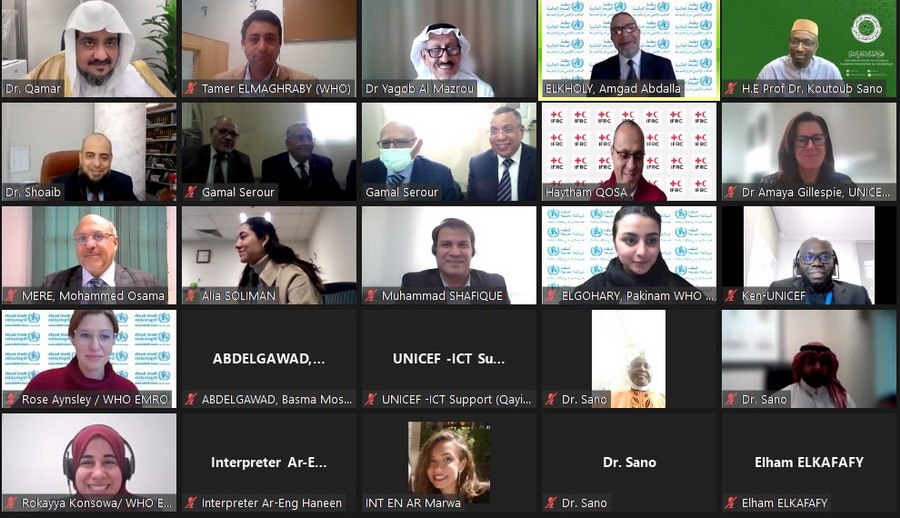
20 March 2022 – Prominent Islamic scholars strongly recommend that people get vaccinated against COVID-19 ahead of the holy month of Ramadan and continue to observe public health and social measures during the festivities to protect themselves and their loved ones from infection.
These recommendations came during a virtual panel discussion with the Islamic Advisory Group (IAG) that included eminent scholars from the International Islamic Fiqh Academy (IIFA) in Saudi Arabia and Al Azhar Al Sharif in Egypt. The event was co-organized by the World Health Organization (WHO), UNICEF and the International Federation of Red Cross and Red Crescent Societies (IFRC) on 15 March 2022.
The holy month of Ramadan represents a time for religious and social gatherings for Muslims around the world. Ramadan returns this year with the COVID-19 pandemic in its third year and there is a need to refocus efforts to increase the uptake of COVID-19 vaccination and ensure that individuals are protected during the upcoming festivities. The virtual panel discussion shed light on how Islamic leaders, ministries of health and partners can support the response to COVID-19 during the holy month of Ramadan.
Speaking of the role of Islamic Shariah in protecting the health of individuals and communities in Ramadan during the COVID-19 pandemic, Professor Koutoub Moustapha Sano, Secretary-General of the IIFA, stressed that the protection of life is one of the five main objectives of Shariah.
“Ramadan is an occasion to take care of our health. We have to make sure we are respectful of Islamic teachings by protecting one’s health,” he explained.
During his presentation, Professor Dr Ibrahim El-Hodhod, Former President of Al Azhar University, pointed out that Al Azhar Al Sharif had issued several fatwas aimed at curbing the spread of COVID-19. One fatwa had addressed the importance of adhering to preventive measures during group mosque prayers, including through wearing masks and maintaining physical distancing, while another had ruled that fasting does not affect the immune system during the pandemic.
Dr Mohamed Mustafa Shoaib, Supervisor of the Fatwa Observatory and Reviews at the IIFA, stated that his organization had issued a number of fatwas reaffirming that vaccination against COVID-19 during fasting is permissible and does not invalidate the fast.
“The academy has called on Muslims across the world to abide by the instructions of health authorities regarding the use of COVID-19 vaccines and to observe public health and social measures,” he added.
Training preachers and students
Dr Abdallah El Naggar, member of the Islamic Research Academy at Al Azhar University, reflected on the fatwas issued by Al Azhar Al Sharif on vaccination and preventive measures and stated that amid the COVID-19 emergency, the protection of oneself is very important according to Shariah. This requires strong adherence to preventive measures, especially amid Ramadan’s social gatherings for the meals of iftar and suhour, and during the group mosque prayers of tarawih.
Dr Abdulqahir Qamar, Director of the Fatwa Department at the IIFA, addressed the issue of vaccine hesitancy and encouraged people to get vaccinated.
“We reaffirm the importance of getting COVID-19 vaccination and booster shots ahead of Ramadan to allow for safer gatherings. Vaccines are permissible as well during Ramadan and during fasting,” he added.
For his part, Professor Dr Gamal Serour, Director of the International Islamic Center for Population Studies and Research at Al Azhar University, spoke of how the above-mentioned fatwas are being used to raise awareness of international students as well as female and male preachers on the ground to act as catalysts of change in their communities and positively impact vaccine uptake.
“On the occasion of Ramadan and in coordination with UNICEF Egypt, we have given awareness sessions in Upper Egypt to more than 6000 students and further developed a medical and Shariah awareness guide on COVID-19 prevention,” he said.
The two-hour long panel discussion was highly interactive and included a Q&A session with participants on current misperceptions and the spread of rumours about COVID-19 in the lead-up to Ramadan and the Eid celebrations that will follow it.
Around 110 participants attended the event from across the Eastern Mediterranean/ Middle East and North Africa region, including faith leaders, ministry of health representatives and WHO, UNICEF and IFRC country focal points for risk communication and community engagement, COVID-19 vaccination and emergency response management.
In his closing remarks, Dr Yagoub Al Mazrou, chairman of the IAG Executive Committee, pointed out that important recommendations had been made for health workers and religious leaders throughout the panel discussion, and encouraged faith leaders and health workers to jointly support public awareness of COVID-19 vaccination in the lead-up to Ramadan and to advocate for adherence to public health and social measures during the holy month and beyond.
“WHO, UNICEF and IFRC are the appropriate organizations to spearhead communicating some of the opinions and fatwas mentioned today across national teams who are working towards curbing the spread of COVID-19,” he said.
“We pray to Allah to protect us from all pandemics and diseases, and may we have a blessed Ramadan.”
About the Islamic Advisory Group
The Islamic Advisory Group (IAG) is an Islamic consortium that was established in 2013 between Al Azhar Al Sharif, the IIFA, the Organisation of Islamic Cooperation and the Islamic Development Bank and includes other religious scholars and technical experts. The objective of the IAG is to raise awareness about priority health issues among local communities by aligning technical and religious perspectives and leveraging religious scholars, mosque imams and community influencers.
For more information please contact:
Ms Alia Soliman
Communications Officer
World Health Organization EMRO
Mobile: +20 127 599 3610
Follow IAG:
Facebook: Islamic Advisory Group for Polio Eradication
Twitter: https://twitter.com/IslamicAdvisory









